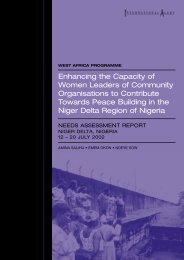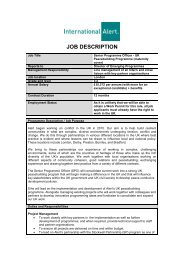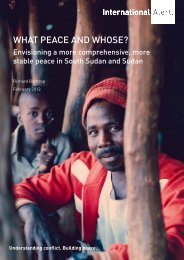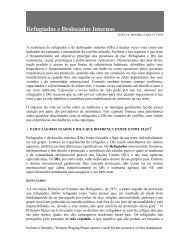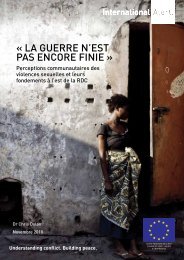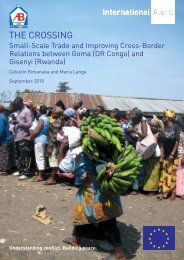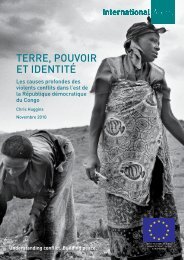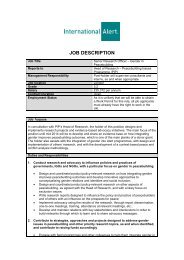Full report - International Alert
Full report - International Alert
Full report - International Alert
- No tags were found...
Create successful ePaper yourself
Turn your PDF publications into a flip-book with our unique Google optimized e-Paper software.
11 • Women’s Bodies as a Battleground: Sexual Violence Against Women and Girls During the War in the Democratic Republic of CongoINTRODUCTIONThe world today is experiencing a new type of armed conflict, different from the moretraditional war between nations. These new conflicts are characterised by the ‘privatisation’of violence 6 and the use of private armies, community self-defence groups and paramilitaryforces, but above all by ethnically-based militias – combatants who have no regard forinternational agreements and protocols, who attack civilians and take them hostage. Theseacts of violence, which are inflicted on entire populations very often include rape and otherforms of sexual violence, both against women, and, increasingly, also against men.In 1996, the Democratic Republic of the Congo (DRC) in the Great Lakes region ofAfrica experienced a first war. This was in part due to internal factors but the countryhad also been affected by the shockwaves of the conflicts in Rwanda and Burundi, whichhad a significant destabilising effect on eastern DRC. These conflicts represent a realchallenge in geopolitical terms; they have altered the overall military picture in Africa andhave made a deep impression on the rest of the world, both because of the complex andentangled nature of the various forces present in the territories affected, and the appallingnumber of civilian victims.The province of South Kivu, the focus of this study, borders on both Rwanda and Burundi,and has therefore served as the point of entry for the foreign troops who have made theirway across the province in all directions since 1996. Before then, in 1994, South Kivu hadreceived more than 1.5 million Rwandan refugees, escorted there by French troops in‘Opération Turquoise’ after the crushing defeat of the former Rwandan army. The militarysituation in this part of the DRC is extremely complex and this study briefly describes thevarious armed groups that are active in South Kivu, either on their own or in alliance withothers, according to whatever is in their own interest at any one time.Another characteristic of the armed conflicts in the DRC is the degree of cruelty and the scaleof the rape and sexual violence committed against women, young girls and sometimes men.The scale of this violence, which some observers have called ‘murderous madness’, 7 promptedRFDP and RFDA, with the support of <strong>International</strong> <strong>Alert</strong>, to examine the socio-cultural rootsof this violence and the different forms that it takes. Some attention has been paid to theseissues by other local and international organisations, but existing studies on sexual violenceagainst women in South Kivu concentrate mainly on describing and condemning theseinhumane acts, and on underlining the fact that they constitute a violation of women’s humanrights. However, no less important is the fact – observed and highlighted in other studies – thatthis type of violence is rarely an isolated phenomenon and that, on the contrary, there is astrong link between violence committed at individual, institutional and structural level.This study is based on extensive data, obtained from detailed interviews with 492 rape victimsand from the examination of files relating to 3,000 victims of rape and sexual violence keptby local organisations. Fifty members of the armed forces were interviewed, but theirstatements on the whole were rather vague and evasive compared with those of the victims.6.Turshen, M., and Twagiramariya, C. (eds.), Ce que font les femmes en temps de guerre: Genre et conflit enAfrique, L’Harmattan, Paris, 2001.7.Human Rights Watch, La guerre dans la guerre - Violence sexuelle contre les femmes et les filles dans l’Est duCongo, New York, 2002.



